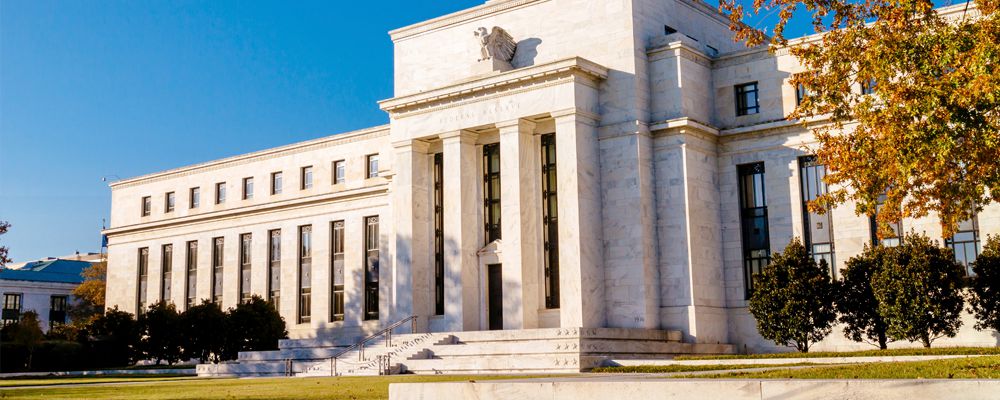A case of good news actually being seen as bad
- Monday, October 8, 2018
 The Federal Reserve Chairman Jay Powell recently announced that “The US economy is enjoying a remarkable positive set of economic circumstances and there was no reason to think it cannot continue for some time”. His comments are a result of the US economy enjoying a 4.2% annual growth rate boosted by Donald Trump’s corporation tax cuts.
The Federal Reserve Chairman Jay Powell recently announced that “The US economy is enjoying a remarkable positive set of economic circumstances and there was no reason to think it cannot continue for some time”. His comments are a result of the US economy enjoying a 4.2% annual growth rate boosted by Donald Trump’s corporation tax cuts.
With this level of growth come the threat of overheating, inflation and the need to then raise interest rates which could destabilise global markets. It is for this reason that stock markets fell in value last week. A case of good news actually being seen as bad.
While most people focus on global stock markets as an indicator of confidence, it is the bond markets that generate the interest rates that determine the cost of new borrowing or servicing existing debt for consumers, companies and governments. The cost of money is therefore set to rise on the back of a booming US economy as investors want higher yields to lend money.
For some time we have been conscience that increases in US interest rates will have an impact upon global bond yields. Global fixed interest has become historically expensive due to ultra-low interest rated and massive quantitative easing programmes. With the Federal Reserve tightening money supply bond yields will inevitably rise to remain attractive and as a consequence bond prices will fall.
On 26th September the Fed decided to hike its funds rate by 0.25% to 2.25%. This is the third rise this year with one more expected in December. Following soon after this announcement US unemployment figures were released. In September US unemployment fell to 3.7% which is the lowest unemployment rate for 48 years. The US economy took on 134,000 new jobs but this was below the expected level of 185,000.
With America’s job growth continuing to impress and which has so far showed no signs of slowing, the yields on US 10 year treasury bonds where extended to 3.23% as investors expect US interest rate rises to continue well into 2019. This rise in yields takes 10 year treasuries to a 7 year high on the expectation that the Fed may have to rein in on inflationary pressures building in the US economy. Any rise in US treasuries impacts the global cost of credit and borrowing.
The Federal Reserve has been giving forward guidance over rate rises which so far markets have taken in their stride. It is the spector of higher than expected inflation building through wage growth due to high employment or consumer demand that will impact upon the rate and timing of future rate rises. The Fed Chairman Jay Powell has indicated we can expect four more rate rises by the end of 2019.
Many economists believe it is only a matter of time before hiring rates slow as the economy runs out of workers. If the Federal Reserve does have to put the brakes on an overheating economy with higher than expected interest rate rises, this will have an adverse impact on inflated asset values. This is an issue we have been wary off and is the main reason behind our overweight position in cash.
Since the financial crisis, the combined quantitative easing (QE) programmes of the Fed, European Central Bank (ECB) the Bank of England (BoE) and the Bank of Japan (BoJ) have added on average of US$ 1.2tn per annum of fiscal stimulus. This level of liquidity will be reversed by US$ 600bn as the Fed reduces its balance sheet of bond purchases by US$50bn each month and the ECB ending its QE in December.
Any policy error by the central banks over interest rate rises and monetary tightening could, with the world economy slowing, be the trigger for an asset value correction.
The recent bond yield hikes and the consequential rise in borrowing costs will hit the heavily indebted businesses and countries most. This is particularly true of business that survived only because of the impact QE has had on lowering interest rates and inflating asset values and emerging markets with high US$ denominated debt. High debt levels will be tested with rising interest rates.
As a consequence of yield rises and concerns over interest rate rises, stock markets had a poor week. The FTSE 100 fell 2.8% while the S&P 500 lost 1.3%.
What the world could do with is no policy mistakes from the Federal Reserve in the way interest rates and inflation is managed, a negotiated settlement to the tariff dispute between China and the USA and a beneficial Canada +++ agreement between the UK and EU. All of these are possible outcomes, but we remain cautious and so our portfolio asset allocation will reflect this at our next rebalance.

Chris Davies
Chartered Financial AdviserChris is a Chartered Independent Financial Adviser and leads the investment team.
About Estate Capital
Financial Services
Our Contacts
7 Uplands Crescent,
Swansea, South Wales,
SA2 0PA.
Tel: 01792 477763
